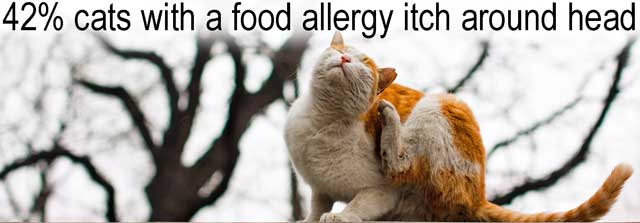Food allergies interest and concern me. I wonder whether they are more common than people think. A cat living in Britain, Munchkin, not a dwarf cat of the same name but a long-haired grey-and-white moggy is allergic to fish, milk, chicken and tinned cat food. She is allergic to foods that cats like. The reaction is so severe that her owners, Mr and Mrs Bean thought she was suffering from a head injury when she went into spasms.
“We thought that she was having a stroke at first before anybody managed to work out what was going on. We were very worried.”

Over a period of 10 months they travelled back and forth to their veterinarian for an endless series of tests during which Munchkin’s condition worsened as she went into regular spasms. In addition she was grooming herself all the time. This was to alleviate itching, it seems.
Eventually, the veterinarian realised that the convulsing Munchkin was allergic to almost everything that she ate. At first the veterinarian gave her steroid injections which brought her fits under control. She still has monthly steroid injections but the vet found a food that she can accept and it is Hills Prescription Diet z/d. This is described as “Low Allergen… Feline Allergy Management”. It is a version of hypoallergenic cat food. It is a dry cat food.
Her extreme allergy to regular cat food is under control. She is injected regularly with steroids. If the injections stop she starts over-grooming again.
I have not heard of a cat going into fits, spasms or convulsions because of an allergy to food. Normally an intensely itchy rash develops on the head, neck and back which may be accompanied by swollen eyelids. There may be hair loss and oozing sores because of constant scratching. Sometimes only the ears are involved. The ears will become red and inflamed with perhaps a moist discharge. There maybe diarrhoea and vomiting. But convulsions, these are not listed as conventional symptoms of a food allergy.

The conventional way to find out what’s happening is by feeding the cat a diet without the suspected food for a month or more and then exposing the cat to the cat food that is suspected of causing the reaction and seeing what happens. You can then, hopefully, isolate the cause of the allergy.
Food hypersensitivity can be initially detected if your cat vomits about two hours after eating. The most common food allergens are chicken, fish, wheat, corn, and soy. In addition cats may be allergic to eggs, dairy products, pork and beef. Also, wheat and corn grains are a common cause of food allergy in cats. Munchkin’s food allergies, although abnormally extensive, are not irregular.
The classic treatment is to put the cat on a commercial diet made without grains. Munchkin’s treatment is standard. Special diets with limited protein sources or treated proteins can be prescribed by the veterinarian. There are other prescription diets to the one mentioned above such as Royal Canin hypoallergenic HP Feline and Royal Canin Neutral Formula Feline. We know that there are a number of others and as far as I am aware they are all dry cat foods.
Dry cat foods are controversial to concerned cat owners and some might argue that even hypoallergenic dry cat foods have certain qualities which are not good for cats but that is a different subject. At least Munchkin can eat without a bad reaction.
Please comment on Facebook to spread the word. Please click “Also post on Facebook”. Thanks:

If this were my cat, I’d find a holistic vet.
Profit is a key value for most vets. The fact that pet guardians are becoming more aware of this, is problematic for the vets.
If a vet makes money on prescription food, that’s what they’ll recommend. And the truth is they know very little about nutrition. What they do know comes from the pet food manufacturers, Hills and Royal Canin, who would naturally push their own products.
Vets are educated to teach pet guardians the dangers of raw food. This education continues through vet websites. And now the FDA is running a (vendetta) campaign to test ONLY raw pet foods for salmonella. What’s wrong with this picture? Well, the fact that there have been so many recalls of COMMERCIAL canned and dry pet food, for salmonella and other toxins.
Commercial raw pet food does not have waste products, diseased animal tissue, and euthanized animals from shelters, etc. which include all the drugs from these animals.
Once we learn what pet food ingredient labels really mean, we’ll be hard pressed to find a “clean” source of commercial pet food. Most people don’t have the time to research this monumental task.
Several months ago I took my cat to the vet for constipation. She gave an enema, and said “she might have a urinary infection” and proceeded to give her antibiotics without any testing. My cat had a reaction to the drugs, and started scratching her ears. I took her to another vet who did a sedated ear cleaning, and my cat had a serious reaction to the drugs. They gave her another drug to reverse the reaction. That took almost 3 weeks to work, and in the meantime, my cat lost weight from not eating, was lethargic and not herself.
I researched the various drugs given, and was shocked at what I found. The antibiotic was known to cause overnight blindness. The sedative had many side effects, none of which I was informed of. And a batch had been recalled the year before.
I had been experimenting with various high quality commercial cat foods until I discovered a locally made raw cat food. I bought a pound of ground turkey with sardines, and divided it up into daily rations, while it was still semi frozen.
My cat took to it immediately, and cleaned her plate like she never had before. This raw food had a major side effect. It relieved her constipation!! She no longer has to take the stool softener, Latulose.
She’s gained her weight back, her coat is silkier and she’s back to her self. Friends comment on the changes in her and in me over the past few months. I was very stressed and depressed during this time.
Raw food has truly been a life saver. Some cats may need time for transitioning, especially if they’ve been given commercially addictive food over a long period. It’s similar to weaning ourselves from processed, sugar laden foods, to a healthier diet. It takes patience, and commitment to giving your pet a chance for a longer healthier life.
Keep in mind who really BENEFITS from commercial pet food laden with toxins and chemicals. Definitely not your beloved animal.
I wonder if the food (if we can consider this food) would work without the steroids. I also wonder how long the steroids can be given, without serious side effects.
Sandra, I agree with you. If this dry food diet were effective, then surely the vet could cease giving steroid injections?
As powerful anti-inflammatories, steroids can be highly effective in treating itchy skin conditions. However in sufficient doses, steroids can also also suppress the immune system. Whilst this may be useful when dealing with an immune system which has gone into overdrive, it also leaves the cat vulnerable to infection, stomach ulcers and diabetes. When steroid treatment is no longer considered necessary, the dosage must be reduced gradually to allow the body time to resume production of natural steroids.
After 3-4 months of continued steroid usage, the condition should be re-evaluated or other treatment options pursued. If a cat requires long-term steroids they need to be monitored with quarterly examinations and urine cultures and blood tests every six months.
I hope that Munchkin is more comfortable now and doesn’t need steroids long-term. If they can find a more feline appropriate diet than prescription dry food, that would be better for Munchkin too.
I agree with you that the solution is not great because I’m sure that most people realise that you can’t give steroids to a cat indefinitely or if you do you’re going to ask for some other health problems. And as you say the hypoallergenic cat food although it works is far from ideal.
Aside from the health risks, I would imagine that if cats suffer the same same common side effects (bloating, swelling, increased/decreased appetite)that humans do when taking steroids, that they might not be feeling that great all the time.
Ingredients in Hills prescription diet z/d:
Ingredients
Brewers Rice, (waste product from breweries, non-nutratrive filler) Hydrolyzed Chicken Liver, Soybean Oil (preserved with BHA (Highly carcinogenic preservative), propyl gallate and citric acid- chemical preservative), Calcium Carbonate, Powdered Cellulose, Calcium Sulfate, Glyceryl Monostearate, DL-Methionine, Potassium Chloride, vitamins (Vitamin E Supplement, L-Ascorbyl-2-Polyphosphate (source of vitamin C), Niacin, Thiamine Mononitrate, Vitamin A Supplement, Calcium Pantothenate, Riboflavin, Biotin, Vitamin B12 Supplement, Pyridoxine Hydrochloride, Folic Acid, Vitamin D3 Supplement,) Dicalcium Phosphate, Taurine, Choline Chloride, minerals (Ferrous Sulfate, Zinc Oxide, Copper Sulfate, Manganous Oxide, Calcium Iodate, Sodium Selenite), Iodized Salt, Ethoxyquin (a preservative), Beta-Carotene.
Analysis:
Protein min28.00%
Fat min12.00%
Crude Fiber max 3.00%
Calcium min 0.50%
Phosphorus min 0.40%
Magnesium max 0.08%
Most of us know that the first 5 are the most critical. Most of this food is chemicals, and may cause problems later on that the vet will prescribe medications for.
The steroids are helping with the itching, but may also have side effects down the line.
I understand that most people depend on vets, and would never consider treating their pets with natural home remedies. Rice is common for allergies, but brewer’s rice is a waste product in pet food that people are paying top dollar for.
Many people and pets are developing allergies to the chemicals in our food, and GMOs. It’s becoming epidemic, with so many people developing IBS, and other intestinal problems.
A sad state of affairs that may seem our of our control.
Yes, I know that this specialist dry food has problems in terms of the ingredients. Assuming that the story is accurate, it worked. In fact it is the only thing that worked and which this cat can eat. I suppose the answer is that it does not contain the ingredients to which the cat is allergic but notwithstanding that the actual ingredients are not, as you state, particularly good.